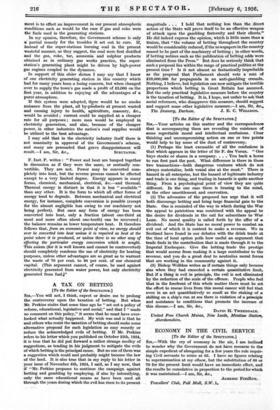[To the Editor of the SPECTATOR.]
Sin,—Your articles on this matter and the correspondence that is accompanying them are revealing the existence of some regrettable moral and intellectual confusions. Clear thinking and uncompromising action on one or two points would help to lay some of the dust of controversy.
(1) Perhaps the least excusable of all the confusions is that which appears in the letter of Sir F. des Voeux. " One buys stocks or shares in a company. . . . You back a horse to run first past the post. What difference is there in these two transactions—both dangerous ventures which do not always materialize, both venial sins at the most." There is hazard in all enterprise, but the hazard of legitimate industry and trade is one thing, and trading in hazards is quite another thing. From a psychological point of view they are quite different. In the one case there is bracing to the mind, in the other unsettlement and enervation.
(2) The advocates of the proposed tax urge that it will both discourage betting and bring large financial gain to the State. One is reminded of the way in which during the. War the appeal to patriotism was combined with the appeal to the desire for dividends in the call for subscribers to War Loan. No moral quality is called forth by the offer of a dividend. And the State has no moral power to combat an evil out of which it is content to make a revenue. We in Scotland have found in our debates with the drink trade at the time of local option polls how useful an argument that trade finds in the contribution that is made through it to the Imperial Exchequer. Give the betting trade the prestige that would accrue from making it a large contributor to the revenue, and you do a great deal to neutralize moral forces that are working in the community against it.
(3) Bishop Welldon writes as if certain things only became sins when they had exceeded a certain quantitative limit. But if a thing is evil in principle, the evil is not eliminated by the reduction of the scale of the offence. People who feel that in the forefront of this whole matter there must be set the effort to rescue lives from this moral cancer will feel that even in an act quantitatively so small as the staking of a shilling on a ship's run at sea there is violation of a principle and assistance to conditions that promote the increase of this disease.—I am, Sir, &c.,
DAVID H. TWEEDDALE. United Free Church Manse, New Leeds, Mintlaw Station, Aberdeenshire.


























































 Previous page
Previous page